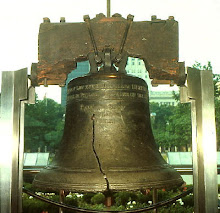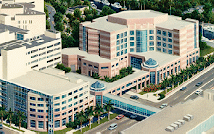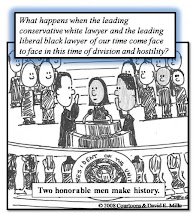
Ted Kennedy's sailboat the "Maya" sailing in Nantucket Sound at Hyannis Port
One of the saddest days of my life was the morning of June 6th, 1968, when I woke up to find out that Robert F. Kennedy had been shot and killed in a Los Angeles hotel after winning the California primary.
Like many young men of my generation, the vision of hope that the Robert Kennedy brought to political forums were inspirational to us. That he could be taken away by a violent act that mirrored his brother’s assassination only five years before was incalculable.
At his funeral, Teddy Kennedy, the youngest brother stood up and gave what I thought was one of the moving and remarkable speeches of my life. I had just spent the past two months at Hofstra University and in the Five Towns Democratic Club as one of its youngest presidents ever, actively organizing Robert Kennedy supporters. I was captured by his magnetism, motivated by his spirit, and enthusiastic about his success. I was devastated by his loss. It was all taken away, so suddenly.
It was about then, in the remarkable year that 1968 would become, I was learning that Life is more chaos than melody, more cacophony than harmony. It was in the searing flames of student activism that I learned that peace does not come peacefully; that rights do not come passively. Robert Kennedy helped inspire that vision. But it was the words of his brother Teddy at the funeral in St. Patrick’s Cathedral which have been etched in my heart and soul for four decades since.
I heard the words on a speaker while standing outside the remarkable church with a half dozen friends from Hofstra. Said Ted:
Like many young men of my generation, the vision of hope that the Robert Kennedy brought to political forums were inspirational to us. That he could be taken away by a violent act that mirrored his brother’s assassination only five years before was incalculable.
At his funeral, Teddy Kennedy, the youngest brother stood up and gave what I thought was one of the moving and remarkable speeches of my life. I had just spent the past two months at Hofstra University and in the Five Towns Democratic Club as one of its youngest presidents ever, actively organizing Robert Kennedy supporters. I was captured by his magnetism, motivated by his spirit, and enthusiastic about his success. I was devastated by his loss. It was all taken away, so suddenly.
It was about then, in the remarkable year that 1968 would become, I was learning that Life is more chaos than melody, more cacophony than harmony. It was in the searing flames of student activism that I learned that peace does not come peacefully; that rights do not come passively. Robert Kennedy helped inspire that vision. But it was the words of his brother Teddy at the funeral in St. Patrick’s Cathedral which have been etched in my heart and soul for four decades since.
I heard the words on a speaker while standing outside the remarkable church with a half dozen friends from Hofstra. Said Ted:
‘My brother need not be idealized, or enlarged in death beyond what he was in life; to be remembered simply as a good and decent man, who saw wrong and tried to right it, saw suffering and tried to heal it, saw war and tried to stop it.
Those of us who loved him and who take him to his rest today, pray that what he was to us and what he wished for others will some day come to pass for all the world.
As he said many times, in many parts of this nation, to those he touched and who sought to touch him:
As he said many times, in many parts of this nation, to those he touched and who sought to touch him:
"Some men see things as they are and say why. I dream things that never were and say why not."
And so, through smiles and sadness, I have tried to see the world that way.
As I turn 60, having dealt with medical issues that have in all likelihood limited my longevity, diminished my strength, and perhaps even reduced my resolve, I think of this man, at 77, sailing on his boat, legislating in the Senate, and championing still causes that were just and honorable. I realize that no matter how tired we are, how beaten back we have been, that we must still do what we can do, while we are here to do it.
Phil Ochs, the great songwriter of the ‘60’s, who gave so much, and so sadly took his own life because of inner demons that got the better of him, spun one powerful song after another. The one that comes to mind today is ‘When I’m Gone’:
Won't see the golden of the sun when I'm gone
And the evenings and the mornings will be one when I'm gone
Can't be singing louder than the guns when I'm gone
So I guess I'll have to do it while I'm here
And I won't breathe the bracing air when I'm gone
And I can't even worry 'bout my cares when I'm gone
Won't be asked to do my share when I'm gone
So I guess I'll have to do it while I'm here
And since I am not in public office, and not on the radio at the moment, I guess I will just stand my ground here on my own blog, while I can, when I can.
As Ted Kennedy stated a year ago, the dream endures, because even today, while there is much we have done, there is still much to do.
All Americans do not have access to health care, and it is next to insane that for a policy of five in my law office, my costs are three thousand five hundred dollars a month.
Gays and Lesbians are still becoming unwanting martyrs, as pockets of hate still strike out violently for no reason, creating the Matthew Shephards who we must mourn.
Immigrants bring their diversity to America, but are treated as slaves once were on migrant farms.
Minorities still populate the jails, and the jails are still indecent and inhumane, offering incarceration for more years, instead of inspiration for better lives.
Mental health patients lack the care and concern are families want to provide them, and the funding our government should give them.
The list goes on. There is always ways to make things that are good, better; ways to ease the pain, right the wrong, and facilitate a tomorrow that bests whatever we have done today. In Broward County, Florida, a false bastion of liberalism, there is an insane repression that makes our criminal justice system far more criminal than it is just.
Allard Lowenstein taught me that those I disagree with are adversaries to be persuaded, not evil to be defeated. The evil which needs to be defeated still exists, though, does it not?
And can anyone say of a man’s life more enriching words than to simply remark that your legacy is to “be remembered simply as a good and decent man, who saw wrong and tried to right it, saw suffering and tried to heal it, saw war and tried to stop it.”
Flaws and failures mark our own lives at different times, but the words Teddy Kennedy once spoke of his brother is now a phrase that marks the glory and the goodness of his own life.
































Good Job Norm, thanks,
ReplyDeleteHow have you never run for public office yourself? Your voice so eloquent, your passion so great..
ReplyDelete